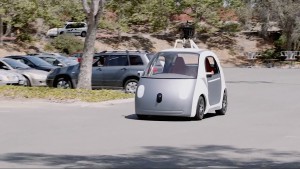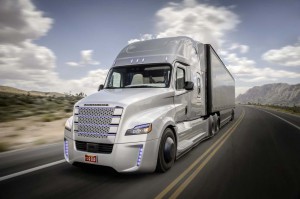
Drivers aren't the only ones who may be unprepared for the expected influx of autonomous vehicles in the coming years: insurance companies aren't either.
If you think you’re not quite ready for the coming age of autonomous vehicles, you’re not alone. And a new study says the insurance industry is particularly unprepared for what could be a game-changing shift for an industry providing almost $100 billion in coverage to U.S. motorists.
Even though automakers are promising to start rolling out semi-autonomous technology in the next few years – with the first, fully-autonomous cars due on the road by as early as 2020, a new survey by KPMG finds that 84% of insurance companies don’t expect the new technology to have a significant impact on their business for at least another decade.
That could be a serious mistake, cautioned Jerry Albright, a leader of KPMG’s actuarial and insurance risk practice. “The disruption of autonomous vehicles to the automotive ecosystem will be profound, and the change will happen faster than most in the insurance industry think,” he warned, adding that, “To remain relevant in the future, insurers must evaluate their exposure and make necessary adjustments to their business models, corporate strategy and operations.”
In one sense, insurers are right that the transition to autonomous technology will take years to implement. With more than 250 million vehicles registered on U.S. roads, and with the average American automobile now about 11 years old, industry analysts say it would likely take until mid-century before the majority of vehicles are equipped with autonomous capabilities.

Insurance companies aren't going to just be dealing with autonomous cars, but also semi-trucks, like Freightliner's Inspiration.
That said, some form of self-driving technology is expected to become commonplace – perhaps even mandated by the federal government – on vehicles in the near future. Cadillac and Tesla, for example, expect to launch technology permitting hands-free driving on the freeway by 2017. Nissan CEO Carlos Ghosn recently said his company is on track to have its first fully autonomous vehicle in production by 2020. And Google is looking for partners to commercialize its autonomous technology by around the same time.
And the revolutionary concept isn’t limited to the passenger side of the transportation industry. Freightliner, the U.S. heavy truck subsidiary of Daimler AG, last month debuted its Inspiration concept, a 70,000-pound 18-wheeler capable of hands-free driving on both freeways and local roads.
Uber, the fast-growing ride-sharing service, wants to go a step further, adding driverless vehicles to its fleet to reduce operating costs. A pilot fleet Google is launching around its Silicon Valley headquarters will have at least some vehicles with no steering wheel or pedals, just an emergency shut-off.
(Want to see America’s highest-quality vehicles by category? Click Here for the report.)
Why, then, is the insurance industry dragging its feet? The KPMG study offers one possible reason.
“Nearly three quarters of insurers (74%) feel they are unprepared for autonomous vehicles today,” stated a summary of the report. “In addition, more than half of respondents (55%) believe that regulators will impede the adoption of autonomous vehicles, which may help to explain why they anticipate a more distant effect on their business.”
Industry observers suggest the shift to autonomous vehicles could lead to significant changes in both the amount consumers drive, and even to the number of vehicles they own in their household fleets.
“As the trend towards car-sharing proliferates and mobility-on-demand companies like Uber and Lyft become more popular, commercial lines likely will take a larger share of the automobile insurance pie,” said Alex Bell, managing director in KPMG’s CIO Advisory practice.
(Click Here for details about the lack of faith some drivers have in fuel economy ratings.)
“The share of the personal auto insurance sector will likely continue to shrink as the potential liability of the software developer and manufacturer increases. At the same time, losses covered by products liability policies are likely to increase given that the sophisticated technology that underpins autonomous vehicles will also need to be insured.”
Proponents of autonomous technology contend such vehicles should prove significantly safer than conventional automobiles. Volvo and Nissan, among others, have suggested that self-driving vehicles will be a key element in their corporate goals of reaching zero highway deaths in the next decade.
At the same time, skeptics question whether self-driving technology will be the promised panacea. Google, for example, has acknowledged its pilot vehicles have been involved in more than a dozen crashes. It stresses that those collisions have not been the fault of its vehicles, however, the majority of the accidents the result of being rear-ended by other drivers.
If autonomous vehicles do prove effective in reducing accidents, insurance companies will likely have to adjust their premiums, noted the KPMG report.
(To get a first look at the 2016 Mercedes-Benz GLC, Click Here.)
“Assuming consumers demand lower premiums to reflect fewer accidents, there is the possibility of frenzied competition,” said Joe Schneider, director of KPMG corporate finance practice.

The insurance issue is one more reason why AVs should NOT be allowed on the roadways until all of the safety, Federal regs and other details are resolved. Why should I and other folks with excellent driving records pay for the crashes caused by not ready for prime time AVs? The answer is that we should not. Those who chose to buy a not ready for prime time AV are the ones who should pay extremely high premiums for half-baked tech that could them and other people killed.
I’m not so sure that “hands free driving” will be good for most people. Time will tell but I’m betting that when a driver is playing with their cellphone instead of watching the road, more accidents will occur even with automated braking which can not compensate for a high speed T-bone hit from the side or some other daily road occurrences. People will assume hands free = braindead driving and react accordingly driving accident rates sky high, IMO.
There is certainly potential for AVs under the right circumstances but those circumstances don’t currently exist not will they by 2025, IMO from what I have seen so far.
The fact that Google autonomous test vehicles keep getting in accidents illustrates the problem.
The google cars got rear ended. That means that it was the other persons fault.
That means it was a human driving the other car. A human was at fault. The human gets the ticket. Unless of course the av was backing up. Not. Spazz drivers spazz comments
Actually the Google vehicles have been involved in over a dozen accidents of which according to Google at least two and possibly four accidents are attributed to the electronics being used while the vehicle was operated in the AV mode. Some of the drivers of these cars have also been responsible for accidents when driving in manual mode. Consumer groups are requesting full disclosure of all AV accidents so that NHTSA and other safety groups can see exactly what the causes are. This is extremely important for public safety.
As noted previously AVs won’t be able to prevent other cars from crashing into them nor provide for passengers in the AVs to take control of the AV if the electronics fail or malfunction as there will be no steering wheel or other driver controls in the AVs.